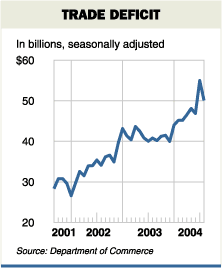Friday, September 10, 2004
Macro updates


The news everyone has focused on is the latest initial unemployment claims figure, which came in as down 44,000 from previous week, which was more than double the decline expected. As Captain Ed notes (Ed's muscling in on my turf, man), each week we get better news on the unemployment level, the better things go for Bush -- Kerry cannot really run on "the worst economy in XX years" when the numbers keep showing an improving economy.
And I wonder how much it really matters. I thought of this looking at this graph from a publication at the St. Louis Fed.
That figure is the share of labor in national income, as measured either by wages and salary alone, or by the toatal compensation package, which includes the employer's contribution to Social Security and employer-paid benefits. Democrats will point to the dashed number, of course, because that last jog downward takes you to a leve we haven't seen since WW2. But when you look at the top solid line, you can see that we have total compensation running about 70-72% of national income, as it has for the entire period (the average is 70.5%). And this doesn't even pick up how we allocate proprietors' income -- if, as the debate over which labor survey is correct argues, we have more self-employed workers than before, perhaps some of what we're calling the share paid to capital is actually paid to labor. The way the statistics are done currently, you divide proprietor's income into labor and capital components at the same rate as the rest of the economy. If more workers are proprietors or independent contractors in small, service sectors, we may be over-estimating the share of income that goes to capital.
Bottom line: If workers give employers credit for putting money in their benefits package, then they probably feel no worse off now than they were four years ago. Subtract another issue for the challenger.
Let me also call attention to this Economic Letter from the San Francisco Fed, which gets into the dueling employment surveys debate. Read the whole thing, but particularly the last two paragraphs, in which the author argues that the household survey might be the one with greater problems than the payroll survey, as the household survey's reflection of self-employment to them is an indication of weakness on the job market, not strength. Think about it, and put something in the comment box. I don't think I agree with it, but I haven't read the underlying studies yet to be sure.
In case you're wondering if I've been reading the Powerline stories on the memo forgeries, the answer is yes. I also watched the Tradesports number on Bush's re-election. It went from 58 to 62 early in the week to Wednesday, slid to 61.7 close yesterday, and currently is trading at 64.1. There's lots of support on the book right now above 61, and nobody selling under 65. Kerry hasn't been above 40 for days. The memos, if anything, have backfired. IEM has Bush trading above 55. On the state markets on Tradesports? Buy Pennsylvania, where you can land Bush contracts at 43-44 while Gallup has him up 1, and Minnesota 39-40 (a thumb for Zogby's eye).









